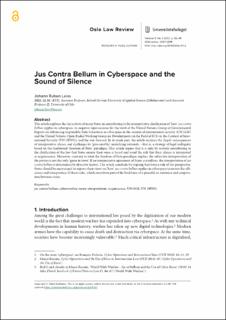| dc.contributor.author | Leiss, Johann Ruben | |
| dc.date.accessioned | 2023-03-17T10:13:05Z | |
| dc.date.available | 2023-03-17T10:13:05Z | |
| dc.date.created | 2022-09-05T10:54:12Z | |
| dc.date.issued | 2022 | |
| dc.identifier.citation | Oslo Law Review. 2022, 9 (1), 26-49. | en_US |
| dc.identifier.issn | 2387-3299 | |
| dc.identifier.uri | https://hdl.handle.net/11250/3058972 | |
| dc.description | Copyright © 2022 Author(s). This is an open access article distributed under the terms of the Creative Commons CC-BY 4.0 License (https://creativecommons.org/licenses/by/4.0/). | en_US |
| dc.description.abstract | This article explores the (in)activity of many States in contributing to the interpretative clarification of ‘how’ jus contra bellum applies in cyberspace, its negative repercussions for the work of the United Nations Group of Governmental Experts on Advancing responsible State behaviour in cyberspace in the context of international security (UN GGE) and the United Nations Open-Ended Working Group on Developments in the Field of ICTs in the Context of International Security (UN OEWG), and the way forward. In its main part, the article analyses the (legal) consequences of interpretative silence and challenges its (presumably) underlying rationale – that is, a strategy of legal ambiguity based on the traditional ‘freedom of State’ paradigm. This article argues that it is only by actively contributing to the clarification of the law that States ensure their voice is heard and avoid the risk that their silence is interpreted as acquiescence. Moreover, contrary to what the freedom of State paradigm implies, the subjective interpretation of the parties is not the only ‘game in town’. If no interpretative agreement of States crystallises, the interpretation of jus contra bellum is determined by objective factors. The article concludes by arguing that from a rule of law perspective, States should be encouraged to express their views on ‘how’ jus contra bellum applies in cyberspace to ensure the efficiency and transparency of these rules, which constitute part of the backbone of a peaceful co-existence and cooperation between states. | en_US |
| dc.language.iso | eng | en_US |
| dc.rights | Navngivelse 4.0 Internasjonal | * |
| dc.rights.uri | http://creativecommons.org/licenses/by/4.0/deed.no | * |
| dc.subject | jus contra bellum | en_US |
| dc.subject | cyberwarfare | en_US |
| dc.subject | treaty interpretation | en_US |
| dc.subject | acquiescence | en_US |
| dc.subject | UN GGE | en_US |
| dc.subject | UN OEWG | en_US |
| dc.title | Jus Contra Bellum in Cyberspace and the Sound of Silence | en_US |
| dc.type | Peer reviewed | en_US |
| dc.type | Journal article | en_US |
| dc.description.version | publishedVersion | en_US |
| dc.subject.nsi | VDP::Samfunnsvitenskap: 200::Rettsvitenskap: 340 | en_US |
| dc.source.pagenumber | 26-49 | en_US |
| dc.source.volume | 9 | en_US |
| dc.source.journal | Oslo Law Review | en_US |
| dc.source.issue | 1 | en_US |
| dc.identifier.doi | 10.18261/olr.9.1.2 | |
| dc.identifier.cristin | 2048776 | |
| cristin.ispublished | true | |
| cristin.fulltext | original | |
| cristin.qualitycode | 1 | |

